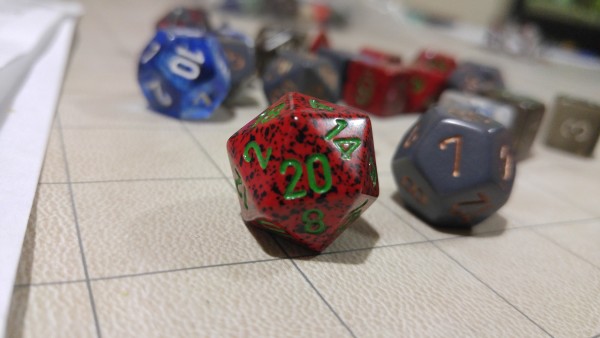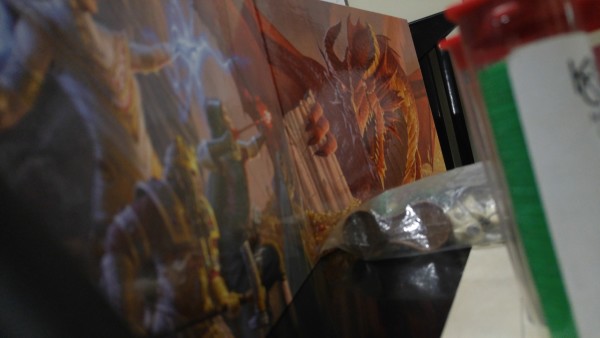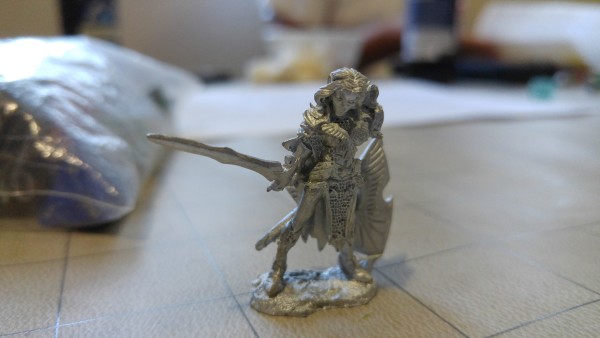So, like the title says… I’m playing D&D 5th Ed (a.k.a. straight up Dungeons & Dragons sans any qualifiers, much like many other reboots happening these days). I wrote a first impressions post a few weeks ago, and felt like it would take me a few sessions to really get a feel for the system. Now that I’m 3 sessions in, it’s probably time for a progress report. What say you!? I agree.
I’ve realized that many of the changes I’m going over have had the effect of streamlining the game, which I’m all for. Streamlining a game without dumbing it down is the ideal, in my opinion, and I think that’s the success of the 5E system.
Still, I think the most drastic change is the Advantage/Disadvantage system. Yes, I spoke a bit on it before, but now that we’re higher in level, we in the group have access to our first Feat. Going through the section of feats show just how completely the Advantage/Disadvantage system blankets the game, and how deep that coverage goes. Seriously, it’s everywhere – and I don’t mind at all.
In my experience, all the different modifiers for things like called shots, prone, acrobatics, obscured vision, tended to get in the way of gameplay. Unless you had a DM that was a real rules lawyer, someone had to look it up. And even if your Dungeon Master was a superb repository of RPG statutes, more often than not one of the PC’s would pull out their own rulebook to contest, and ooh, look… we’ve just wasted 5 minutes arguing whether the Halfling has to roll for that headshot at a -2 or -3. Now that it’s replaced with Advantage/Disadvantage, the Swiss Army Knife of D&D 5th mechanics, that conversation no longer happens. Melee attacking through tall grass, disadvantage. Attacking a prone opponent, Advantage. Surprise attacks, Advantage. It’s terrific, in a good way.
Another bit of streamlining: the global Proficiency Bonus. Back in previous editions, advancing in level unlocked new powers, but your existing moves would improve as well. Back in 2E, your THAC0 would decrease. In Pathfinder, you would have to add points to skill slots. All of these things would improve in a different way, and were determined individually. 5E has shifted away from that, and again has gone with a blanket approach. Instead, there’s a global proficiency bonus that not only finds its way into skills and to-hit rolls, but also into saving throws and spellcasting DC. So, you tend to keep your same Skills, but your character improves their ability in said skills and in through the Proficiency Bonus.

For example: Let’s take my character’s Stealth skill.
Bobanthalas has proficiency in Stealth, which is a DEX-based skill. As such, his total Stealth modifier includes the +4 from his 19 DEX ability modifier (W000 Elven dex!) and his +2 global Proficiency Bonus (because he took Stealth as a proficiency in the beginning) for a total of +6. Now, when Bobanthalas hits level 5, his global Proficiency Bonus increases to +3, which will affect every skill in which he’s taken proficiency.
So, his new total Stealth modifier becomes +4 (DEX ability modifier) + the +3 from his newly improved Proficiency Bonus, for a total of +7. Now, it also affects the other Skills in which he’s taken proficiency, Athletics, Perception, Persuasion, and Sleight of Hand – he’ll get a +3 in those now too.
Streamlining.

I brought up Feats earlier, and should probably go into a bit more detail. Feats are a bit buffed in comparison to previous editions. Rightly so, as they’re a bit more difficult to acquire this time around. At level 4, you get to make the choice between increasing an ability score by +2 to the max of 20, or two ability scores by 1, OR taking a Feat. That’s what they’re equating the power of Feats to these days, a +2 in an ability score, or a Feat.
It makes sense, as some of the Feats include ability score increases as well. For example, I took the feat Resilient, for Bobanthalas. Resilient allows me to choose an ability score, increase it by +1, and then apply my proficiency modifier to any saving throws that have to do with that ability score. I picked Constitution, so I increase my CON by plus one, and my global Proficiency Bonus now applies to any saving throws against Constitution. Game changing.
Other Feats include things like Lucky, which actually affect the DM’s dice rolls. Holy God Hand, Batman.
Finally, and probably the most painful lesson learned – there is no such thing as a trash mob. Gone are the days of your level 2 barbarian carving a swathe out of a sea of kobolds, or orcs, or owlbears, etc.
Everything in the new Monstrous Manual has been buffed. Anything, and everything can and will kill you if you aren’t smart about combat.
Know your character and it’s weaknesses, as well as your companions’ strengths – and for the love of Reohm, work together. Solo-tanking an orc warchief, that’s no longer a thing. You need support these days.
And that, folks, is something that took us a Total Party Wipe to learn.

